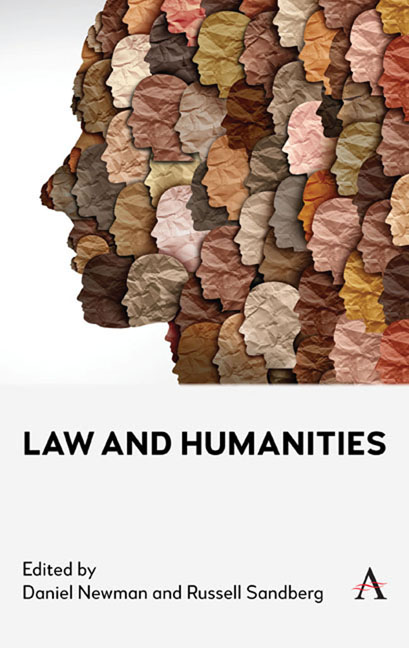Book contents
- Frontmatter
- Contents
- Preface
- List of Contributors
- Chapter One Introducing Law and Humanities
- Chapter Two Law and Archaeology
- Chapter Three Law and Comics/Graphic Justice
- Chapter Four Law and Film
- Chapter Five Law and Geography
- Chapter Six Law and History
- Chapter Seven Law and Literature
- Chapter Eight Law and Philosophy
- Chapter Nine Law and Popular Music
- Chapter Ten Law and Religion
- Chapter Eleven Law and Television
- Chapter Twelve Law and Theatre
- Chapter Thirteen Law and Theology
- Chapter Fourteen Law and Video Games
- Chapter Fifteen Conclusion: Subverting the Law and Humanities Canon
- Index
Chapter Twelve - Law and Theatre
Published online by Cambridge University Press: 27 March 2024
- Frontmatter
- Contents
- Preface
- List of Contributors
- Chapter One Introducing Law and Humanities
- Chapter Two Law and Archaeology
- Chapter Three Law and Comics/Graphic Justice
- Chapter Four Law and Film
- Chapter Five Law and Geography
- Chapter Six Law and History
- Chapter Seven Law and Literature
- Chapter Eight Law and Philosophy
- Chapter Nine Law and Popular Music
- Chapter Ten Law and Religion
- Chapter Eleven Law and Television
- Chapter Twelve Law and Theatre
- Chapter Thirteen Law and Theology
- Chapter Fourteen Law and Video Games
- Chapter Fifteen Conclusion: Subverting the Law and Humanities Canon
- Index
Summary
Prologue, ‘All the world’s a stage […]’
A figure steps onto a stage.
Silence falls as she looks into the audience. And then she begins to speak. The words are ornate and she delivers them like prophecy. A story unfurls: of broken dreams and bad decisions, of rights and wrongs. The speaker will be judged; lives will be changed.
This is a scene which lawyer and thespian alike have played a thousand times or more. Indeed, the resemblances between law and theatre often start here: with a single orator skillfully putting their case before an audience. Like an actor, a lawyer must interpret a central text and use it to tell a convincing story.
In each discipline, language is king. Without language, how would we articulate our individual and collective rights? How would we codify norms and behaviours? In literature, the power of language predates the written word: long before we could write, we could recite. We would gather around a fire to recount tales we’d heard a thousand times, and fashion new ones besides. Language is primal: it takes us back to who we were before.
But even the finest words can fall flat. Law and theatre require an orator: more than that, they require a conjuror who can bring the words to life. This is the intervention which separates theatre from literature: a live, transforming presence. A performance. There is a magic to this space: things emerge from it differently to how they entered. Things may happen twice but they do not happen the same. It’s not a paradox: it’s show business.
Enough of the abstract, for now. We will return to it in due course. Instead, let’s go back to the beginning.
Act One, ‘And all the men and women merely players’
Theatre’s purpose, says Hamlet, is ‘to hold […] the mirror up to nature’.
It can also show the law its true face. That, at least, seems to be a central tenet of law and theatre, which reframes legal actors as stage players and doctrinal issues as dramatic devices: the case its plot, the courtroom its stage. Law and legal matters have formed the two hour’s traffic of many a stage, from Oedipus Rex to Othello and beyond. The courtroom itself is a theatrical space, in which costumed lawyers wear wigs and billowing robes, take their assigned places and address an ‘audience’ of jurors.
- Type
- Chapter
- Information
- Law and Humanities , pp. 187 - 200Publisher: Anthem PressPrint publication year: 2024



